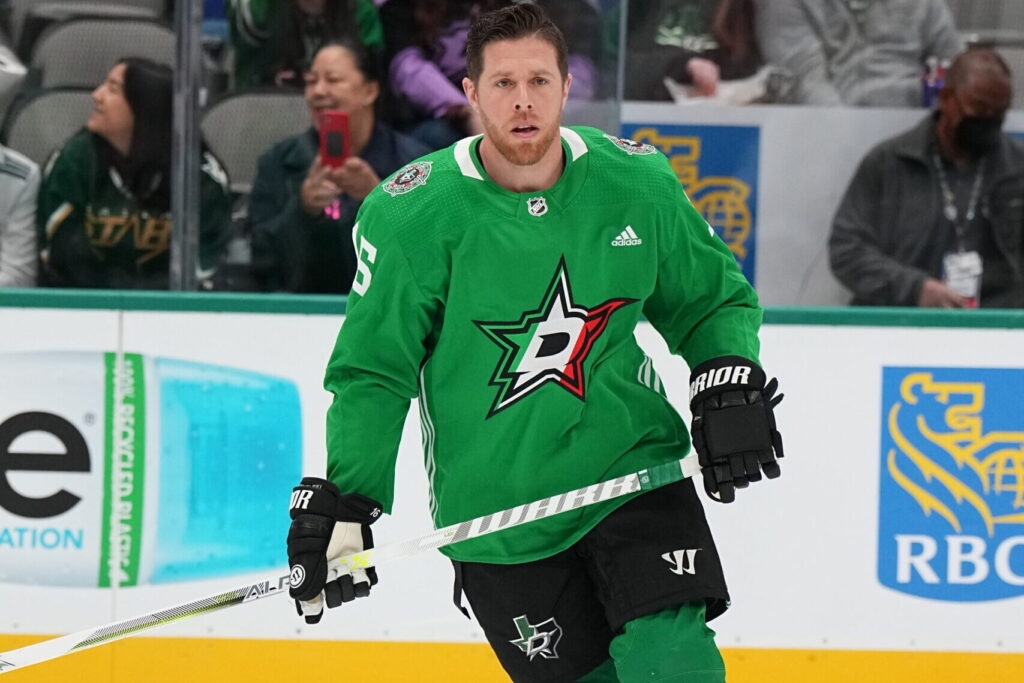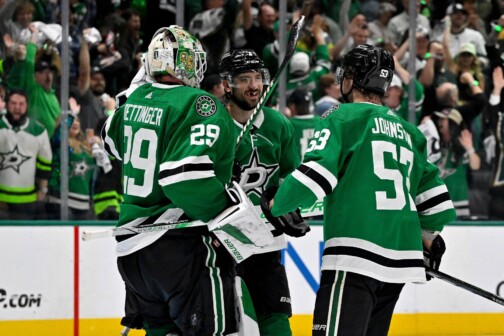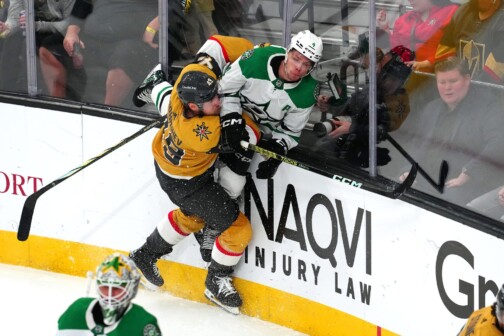If you’re reading this, you’re probably a hockey fan. But hockey fandom can sometimes be a tough sell, given NHL and North American hockey culture. This is the sport where prominent figures like Mike Milbury and Jeremy Roenick make sexist comments. Where Akim Aliu was racially abused by his head coach, Jordan Subban by an opposing player, and Devante Smith-Pelly by four fans whom the Chicago Blackhawks later banned. The Blackhawks, of course, are the same organization that once employed Kyle Beach, whose career and life were damaged, possibly irrevocably, when he was sexually assaulted by the team’s video coach, then watched the organization’s head coach and general manager cover everything up.
It’s why I approach any Hockey Is For Everyone gesture with a large dose of skepticism. Yet, as fate would have it, I attended one such gesture last week when the Stars played the L.A. Kings for “Noche Mexicana” at American Airlines Center. I was there because while this isn’t the first such event the Stars have orchestrated, it is the first under the watch of Alvaro Montoya, the former goaltender who is now the Stars’ director of community outreach. I was there because he invited me, and since it just so happened to coincide with my taking time off of work, and since my immediate family lives in Dallas (I live in San Antonio), I couldn’t say no. Family, friends, and hockey are three things I grew up with and love the most.
I didn’t go to the game to write a story. I was there to talk to my dad about how life in the sweaty machine shops is and when I can take his 1970 midnight blue Nova out for a drive. I wasn’t there to gawk at the vibrant colors of the Mexican aesthetic highlighted on everything from jerseys to lucha libre masks. I was there to ask my mom about her new job with the city and enjoy her home cooking. I wasn’t there to listen to Selena’s greatest hits, which blared outside the arena while Tacos Insurgentes served traditional Mexican street cuisine. Plus, if I’m being a heinous nitpicker, quesadillas aren’t my thing. I’m a breakfast guy, so molletes are my first choice when I’m in the mood for “traditional Mexican.”
Que hermosa 😍#SomosStars pic.twitter.com/azBr8PPqHv
— Dallas Stars (@DallasStars) March 2, 2022
It was fun to see fans treated to traditional folk dances native to Jalisco. It was great to hear Spanish covers of “Welcome to the Jungle” and “Hotel California” (by the Gipsy Kings, of course). And it was even better to see the fan cam fixated on the Latin American faces enjoying what ended up being a brilliant performance by the Stars.
But none of this connected with me. At least not on the surface. I’m from the North Texas suburbs. Sure, I grew up on Blood In, Blood Out, and La Bamba, but these were just movies, not culture. I grew up on electric guitars and rollerblades. Pantera was my anthem, not Tejano. My streets were Gendy (where I went to rocket camp in grade school) and Exchange. My food was chicken-fried steak and mashed potatoes, not Menudo. My parents had no interest in speaking Spanish to me growing up. The racism their parents experienced ensured it could never be a source of pride.
That requires some explanation, so here it goes. My mom often told me a story from when her mother was in grade school and needed to use the restroom. She asked her teacher for permission in Spanish, a language the teacher didn’t speak. That teacher could have made an effort to understand what my grandmother meant. Rather than try, the woman let her urinate right there on the classroom chair.
I don’t mention that story for sympathy. It’s important, I think, that we don’t internalize the struggles of others. My grandmother lived life as a Mexican woman at a time when the Federal Housing Administration’s first major housing economist listed Mexicans as the racial group to have the greatest negative impact on land value. Meanwhile, I’m just a straight Chicano male with enough vanilla interests to easily fit in wherever I’ve been. Treating my grandmother’s burden as if it were my own would amount to nothing more than stolen valor. But I’m getting better at paying attention, which is all you can do. And so I paid attention to “Noche Mexicana.”
¡NOS ESTAMOS DIVIRTIENDO MUCHO ESTA NOCHE!
— Dallas Stars (@DallasStars) March 3, 2022
That, I think, was the point. Under the guidance of Montoya, the event was all about paying attention. As he told Lauren Merola, “These kids now will see representation because it really does matter. You don’t have to be a professional athlete, but you have to know that there’s room for you in this game, whether that’s on the ice or in the office.”
If you’re going to make a sincere attempt to reach a large Latino audience, language is where you start. Learning multiple languages is not an ethics test, but it does reflect sympathy for what a person has to say. The Stars did a great job in this respect. Their Twitter account made comments and cheap but amusing puns in Spanish, along with blasting out one of the best goal calls I’ve ever heard in my life, which came on the Spanish telecast. Small gestures, sure, but powerful ones that helped “diversity” and “representation” feel bigger than buzzwords.
Because positive representation for underrepresented groups does matter. They have the passive effect of helping us understand people and cultures different from our own in ways that go beyond stereotypes. And they have the active effect of helping influence a person’s self-determination. I don’t know how much my approach to college would have changed had I not been the first to graduate on either side of my family tree, but that kind of achievement shouldn’t have to feel bittersweet.
This is uniquely important for Latin Americans because there are so many groups within groups, something Montoya and I discussed in October. And this was a night that celebrated Mexican culture. The Mexican philosopher Emilio Uranga calls us “accidental” beings, defined by a lack of foundation and the need to keep from being forgotten, hence the fascination with death in our national holidays. If you want a more accessible way to take in his meaning, just watch this scene from Selena:
To most people—me included—”Noche Mexicana” was just one game on one night. But for one game, on that night, hockey paid attention. It might seem like a small thing, but it’s how progress starts.
When Stan Lee and Jack Kirby created the Black Panther comics, they revealed exactly why: because they paid attention to the lack of Black superheroes in comics. Now hockey is paying attention to the lack of Latinos representing the sport on and off the ice. Will the Stars celebrating Latino pride bring back the disappearance of Latinos from traffic records or the Latino neighborhoods that disappeared right here in Dallas? Will it improve health outcomes for Latinos that are notoriously lacking? That’d be a nice trick, but no. It’s paying attention to what it can.
Of course, that’s the optimist in me talking. In truth, hockey hasn’t earned the benefit of the doubt. The game still pays attention to Milbury, who recently doubled down on his comments about women as “distractions” and even rescinded his initial apology. The game still pays attention to everyone involved in the Logan Mailloux controversy. Hockey still pays attention to John Vanbiesbrouck, hired in 2018 as USA Hockey’s assistant director of hockey operations, who called former Stars defenseman Trevor Daley the n-word on multiple occasions, when he was a young prospect. Remember Blackhawks chairman Rocky Wirtz and his unhinged response to Mark Lazarus’ completely appropriate question? Does anyone doubt that hockey will once again pay attention to Joel Quenneville in the near future?
I’m not interested in discussing these men’s second chances. I’m interested in the qualified people who aren’t given one. When I started watching hockey, it was everything I loved: fast paced, violent, and skilled. But I fell in love with it because I reached out to discover it. I played video games, even the weird ones. I bought my own skates. I (foolishly) practiced the knuckle puck. I bought expensive laundry. I went to Reunion Arena.
I’ve always been willing to pay attention to hockey. For one game, on one night, hockey finally felt like it was paying attention to people like me, my family—and not just Mexican Americans, but Cuban Americans like Montoya himself, Puerto Rican Americans, Americans from Guatemala, and the host of Latin American generations to come. It’s hard to give hockey the benefit of the doubt. But it’s not hard to pay attention. We’ll know they’re serious when “Noche Mexicana,” as fun as it was and is, no longer has to be a celebration. Because you’ll see Latin American faces on the ice, in the stands, and maybe even running a professional hockey team. Diversity will be the reality in hockey. Just as it is outside of it.
Author







